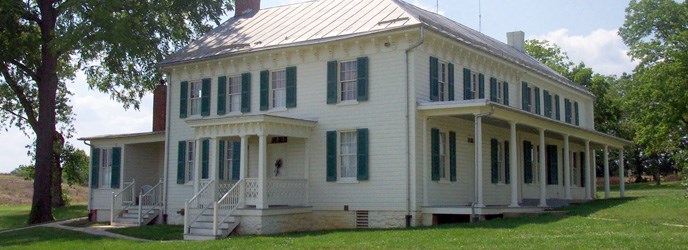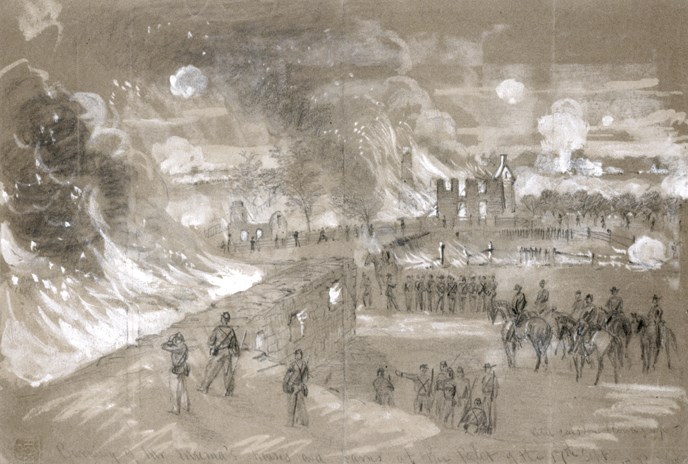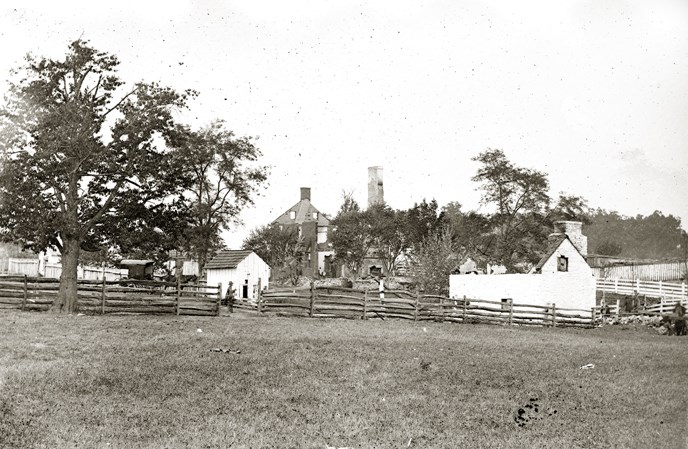
Introduction The only deliberate destruction of property during the battle was the burning of this farm. Confederate soldiers were ordered to burn these structures to prevent their use by Union sharpshooters. Fortunately, Samuel Mumma and his family had fled to safety before the battle. The Mumma family rebuilt the home in 1863. "...a set of farm buildings in our front were set on fire to prevent them being made use of by the enemy." This farmstead and cemetery were part of Samuel and Elizabeth Mumma's property in 1862. Warned of the coming battle, the Mummas and their ten children fled to safety. Fearful that Union sharpshooters would use the farm buildings as a strongpoint, Confederates set fire to them. The column of fire and smoke was visible all morning above the battlefield. This fire was the only deliberate destruction of civilian property. One Union soldier remembered, "Just in front of us a house was burning, and the fire and smoke, flashing of muskets and whizzing of bullets, yells of men …were perfectly horrible." The Mummas spent the winter at the Sherrick farm near Burnside Bridge and were able to rebuild in 1863. After the war, the Federal Government compensated residents for damage caused by Union soldiers. However, since this farm was burned by Confederates, the Mummas received no compensation. Starting in 1870 the family deeded interest in this burial ground to local families. Neighbors who suffered from war and came together to rebuild their community, now rest together in this peaceful enclosure. 
Library of Congress 
Library of Congress TranscriptHello everyone. My name is Mark Cheney. I'm a park Ranger here at Antietam National Battlefield. Today. I'm here at one of our 11 farms, the Samuel and Elizabeth family cemetery and farmstead. Now, while the entire community of Sharpsburg, MD, was affected by the Battle of Antietam, it is the Mumma family that would experience the only deliberate destruction. On September 17th of 1862. A few days before the Battle of Antietam, Samuel and Elizabeth Mumo, along with their ten children, were attending their Sunday service at Tour Stop 1, the Dunker Church. It was during this service that rumbling artillery fire from the Battle of South Mountain, only 6 miles away, could be heard by noon. Clouds of smoke could be seen coming from South Mountain the next day. Soldiers from the Confederate Army would begin to arrive, warning the locals of the coming battle. As the Mumma family tried to pack as many of their belongings as they could, the fear and urgency of the approaching conflict would force them to leave nearly everything. Behind the family would flee to another church only a few miles north of the battlefield, the Manor Church, and remained there until the fighting was over. As the Confederate Army began to arrive around the fields of Sharpsburg, the area around the Mumma farm and the Dunkirk church would become the center of the Confederate line station, just South of the Mumma farm is Confederate Brigadier General Roswell Ripley and his brigade, fearing the strategic advantage that the Mumma home could have for advancing Union soldiers, Ripley would order his men burn down the home. Members of the third North Carolina under Sergeant James Clark would volunteer for the task. Sergeant Clark later recalled quote throwing a torch through an open window and onto a quilt covered bed. Within a few moments, the whole house was in flames. By 9:00 AM, the fire had spread to the barn and surrounding outbuildings and advancing union soldiers could see the flames as they marched towards the Confederate line. The Union troops moving past the burning farm are the other two divisions of Edwin Sumner's Second Corps. As the fighting continued to move southward, federal forces would be moving past the Mumma Farmstead, moving past the William and Margaret Roulette Farmstead, working their way towards the Confederate line. Now, because of these rolling hills rolling terrain behind me, the federal line had no idea they were marching towards a sunken farmers or a sunken road that held nearly 2200 confederate soldiers. After Cedric's line advanced into the West Woods, the remaining 2 lines would move South to support Sedgwick's left and advance toward Sharpsburg. 1 soldier from the 83 New York remembers quote, “just in front of us a house was burning, and the fire and smoke flashing of muskets and whizzing of bullets yells of men were perfectly horrible.” The family would return to their home two days after the fighting on September 19th. Everything they had, everything they owned, lost, stolen or destroyed. All that remained from the destruction, with the clothes on their backs and a gold pocket watch that was given to three-year old koruma to entertain her while the family was away. After the battle, the Union Army encamped on the fields around Sharpsburg for several weeks while staying in the area. The soldiers would continue to take necessary supplies from the farmsteads Samuel Mumma was told that he would receive a payout from the United States government for the items that he lost when one never came, Samuel would file his own claim for some of his losses, but he was told that his losses were a direct result of battle and therefore ineligible for any reimburse. In 1885, the Mumaw family would file a second claim, which was much more extensive, claiming nearly $8000 in loss. This claim was also denied by the government, stating that Confederate forces did the damage, so the federal government was not responsible. Starting in 1870, the Mummas deeded interest to their family cemetery to local families. Neighbours who suffered from war and came together to rebuild their community now rest together in this peaceful enclosure. Samuel Mumma would pass away in 1876 and would be joined by his wife Elizabeth, 10 years later. Today, the Mumma family continues to rest peacefully here near their home, 44 years after the Mumo family had lost their home, Sergeant James Clark from the third North Carolina would write a letter to the town of Sharpsburg's postmaster. The letter began with, “Dear Sir, please be so kind as to give me the correct name of the man who owned or lived in the brick house that was burned at the Battle of Antietam. This House stood immediately in our front as the battle was being commenced and at the times was an enemy lines. General Ripley, to prevent its occupation by sharp shooters and protect his officers, ordered it burned. Company A volunteered and I took charge of again.” To Sergeant Clark's surprise, he received a response from the Sharpsburg postmaster just three days later, the letter reads. Quote, Dear Sir, in reply to your letter of March 19th asking for some information concerning the burning house, I will say that the House referred to was owned by my father, Samuel Newman senior. The letter concludes with quote “As to your burning our house, we know that in doing so you are carrying out orders and closed. Find a few souvenir postals of the battle, hoping that these points will help you in your work. I am sincerely Samuel Mumo, junior postmaster of Sharpsburg area.” Like so many other families around Sharpsburg, the Mumma family had taken a heavy loss through the winter of 1862. The Mummas would stay on another farmstead on the battlefield. The Sherrick Farm near the Burnside Bridge would become their home for the next several months. In 1863, the Mummas rebuilt their farmstead. The farm that sits at Antietam today is the same structure that the family rebuilt a year after. Today, that structure has been given a new purpose. In 2001, the National Park Service started preservation work on the farmhouse and barn to restore the property to its 1863 appearance. It is now used as an Education Center for visiting students so that they may better understand the history and significance of the Civil War, Antietam, and life in the 1860s. One of the most important things about Antietam that not many people realize, is that people lived here before. It was a battle after it was a battle, but these were peoples homes. Families were started. Your children raised your memories created here. And all of that changed in September of 1862. And as the Mumma Farm burned, the fighting would continue. Join us at our next tour stop as we continue to follow the Union advance towards Tour Stop 8, the Sunken Road or the Bloody lane.
Go to the next tour stop -The Sunken Road |
Last updated: April 16, 2023
